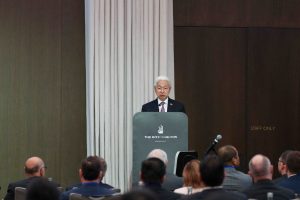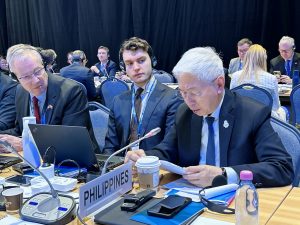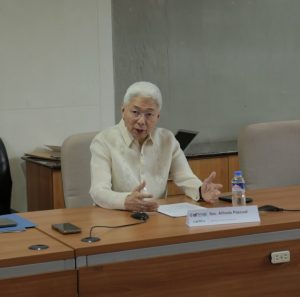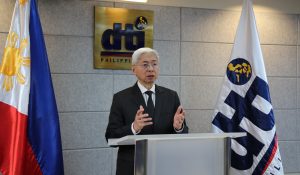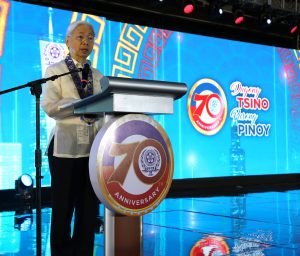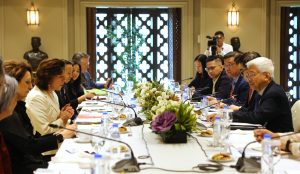Ladies and gentlemen, a good afternoon to you all.
First of all, the Philippines would like to commiserate with Indonesia in dealing with the recent surge of the COVID-19 Delta variant and we express our deepest sympathies for the lives lost and we wish for the recovery of those infected. We pray that this pandemic will die down soon to allow us to restore the many livelihoods that were taken away by this health crisis.
Secondly, allow me to thank the Indonesian Embassy and the Indonesia Diaspora Network (IDN) for giving the Department of Trade and Industry (DTI) the opportunity to discuss updates on the Philippine e-commerce landscape. More importantly, this would be the appropriate time to update everyone on areas of opportunities between the Philippines and Indonesia on e-commerce cooperation.
We’d like to note that both nations share strong cultural and historical ties that go beyond close geographical links and shared experiences of the past. The combined population alone of the Philippines and Indonesia accounts for more than half of ASEAN’s population. What’s more, Indonesia is our ninth major trading partner last year, our 16th top export market, and our fifth chief import source. But we can still maximize this trade relationship further, and one clear opportunity is for more collaboration and cooperation on areas of mutual interest, like digital trade and e-commerce.
Like the rest of the world, the Philippine economy was severely affected by the pandemic. With the spread of COVID-19, we undertook swift actions and imposed lockdown measures that resulted into the temporary closure of business establishments. Unfortunately, our local micro, small, and medium enterprises (MSMEs) were among those severely affected by the economic effects of the pandemic.
But amidst these challenges, we also saw how these MSMEs pivot their business models and shifted to e-commerce & digital technologies. Our online business registration leapfrogged from about 1,800 per quarter to about 30 thousand per quarter in 2020. We witnessed how the world further adopted digital technologies and digital economy for the continued provision of goods and services. According to the Google Temasek 2020 Report, there was a significant increase in number of internet users in the ASEAN region from 360M in 2019 to 400M in 2020. The internet economy has also grown amidst slowdown in economic activity from USD100B in 2019 to USD105B in 2020. Online digital services likewise experienced a significant uptick in new digital consumers, with education, groceries, and lending experiencing a significant increase in the number of new users—from 32% to 55%.
That’s why on the regional front, we should support the ASEAN’s vision to become the leading digital community and economic bloc that is powered by secure and transformative digital services, technologies, and ecosystem. These elements will be crucial in the development of a more robust and responsive e-commerce environment in the region.
We’d also like to point out that the Philippines and Indonesia also saw exponential growth in new consumers to Internet economy services, growing by around 37%. With this in mind, we should exchange best practices on how we were able to assist MSMEs’ transition to digital in the time of the pandemic.
On the part of the Philippines, we’ve long since recognized the role of e-commerce in the country. Since then, efforts have been made to promote electronic transactions and create a safer environment for online consumers and merchants.
With our updated e-Commerce Philippines 2022 Roadmap, we aim to increase the contribution of e-commerce to our country’s GDP. To this end, the roadmap’s goals are: increase the number of local e-commerce enterprises from 500,000 in 2020 to a million by 2022; develop a digitally skilled workforce to support the growing e-commerce sector; and empower online consumers and build trust between merchants and buyers.
Additionally, we intend to have the United Nations Electronic Communications Convention (ECC)—which the Philippines signed in September 2007– ratified. This is the only treaty that deals with e-commerce law and ensures the principles of e-commerce are recognized and enforced across borders. Having the ECC ratified is also aligned with the “Vision for Cross Border e-Commerce in ASEAN” by the US-ASEAN Business Council.
Meanwhile, we plan to enact an “Internet Transactions Act” (ITA) that would create the e-Commerce Bureau, develop a “TrustMark” for trustworthy internet transactions, and establish an Online Dispute Resolution System. Furthermore, we will set up the e-Commerce Promotion Council with the help of the private sector to promote e-commerce and digitalization in the country.
DTI likewise has a number of interventions that offer e-commerce skills to help our people upskill and reskill during the pandemic. In particular, the DTI e-Commerce Office (ECOM) developed a TRABAHO or jobs training pathway aimed those who want to get jobs in e-commerce, and a NEGOSYO or business training pathway that would assist MSMEs. And of course, we have programs with Amazon, Google, Microsoft, Facebook and Alibaba that would provide our MSMEs greater market access abroad.
In closing, as we build back better, our MSMEs should take advantage of this uptrend in digital trade and e-commerce to facilitate the post-pandemic economic growth and recovery of both of our nations. To this end, we hope MSMEs from both the Philippines and Indonesia will be able to participate in the upcoming second ASEAN Online Sale Day this August to boost online consumer trade in the region.
But we should also ensure trade and investment ties remain open to minimize disruptions in the regional and global supply chains—especially with the digital economy. Through digital trade and e-commerce, we will not only strengthen relationships between nations, we will create a post-pandemic future wherein all our people will enjoy a more comfortable and greater quality of life.
Thank you very much and mabuhay po tayong lahat! ♦
Date of Release: 24 July 2021





